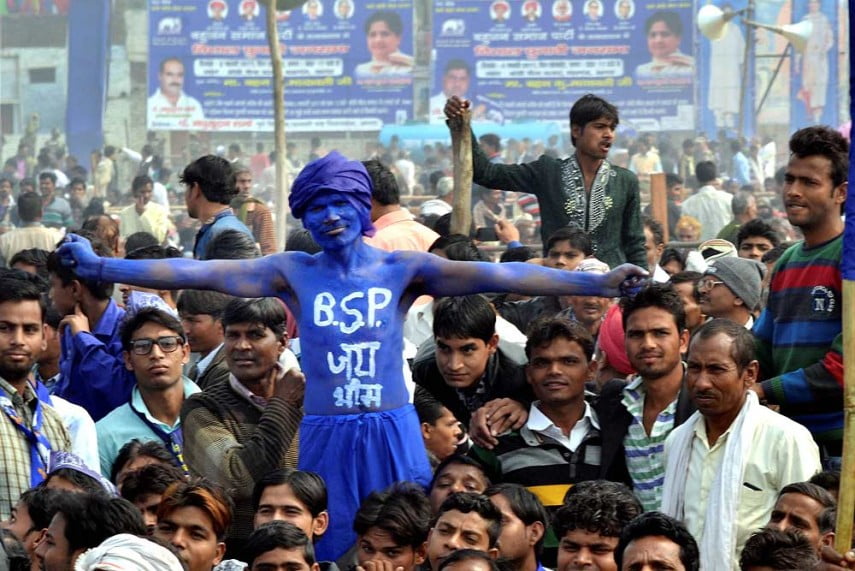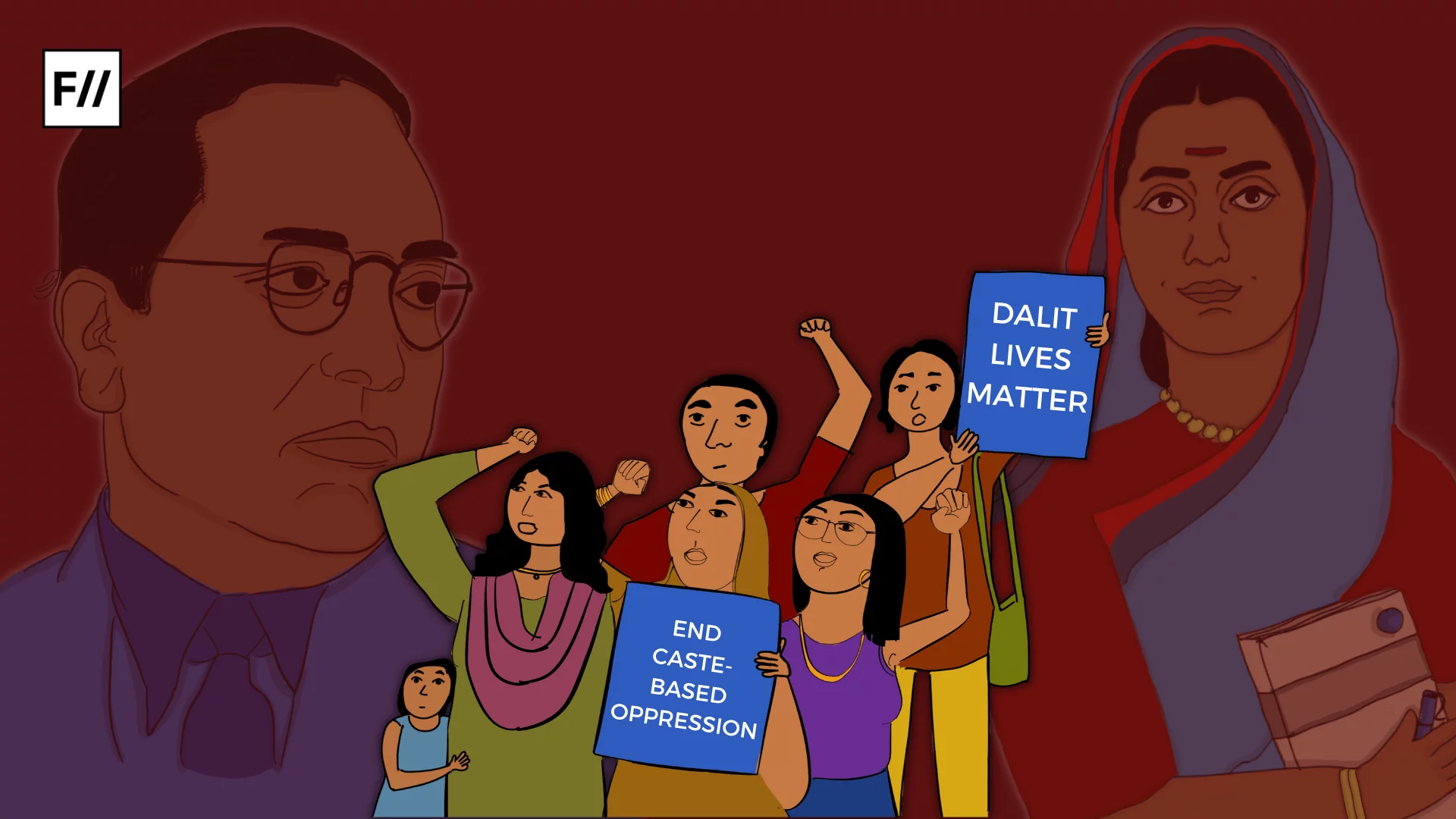Editor’s Note: This month, that is April 2020, FII’s #MoodOfTheMonth is Dalit History, where we invite various articles about historical moments in Dalit movements as well as Dalits in history who have been part of the anti-caste movement in India. If you’d like to share your article, email us at pragya@feminisminindia.com.
“Every time you are accused of engaging in ‘identity politics’, a term used to discredit issues that make the status quo uneasy, just know that politics is connected to identity for everybody. It’s just that some identities are so centered in politics, that it has become customary.”
Whenever I have tried to call attention to the issues that people in my community face, I have been told to not indulge in ‘identity politics’ and to focus on the larger cause at hand. With its popular usage on social media especially to denounce women, Bahujans, LGBTQIA+ and Muslim communities, one wonders what this term actually means, in a world, where all kinds of politics is inherently a politics about identity. All major political players in the country have tried to grab votes based on their majoritarian identity – Rahul Gandhi flashed his Janeu, Arvind Kejriwal visited a temple, Narendra Modi went to Kedarnath – all ahead of the general elections.
This also begs the question: Why are dominant caste Hindu men allowed to display their identity without any protest from the society, but identity-based issues of the marginalised are vociferously trivialised?
With its popular usage on social media especially to denounce women, Bahujans, LGBTIAQ+ and Muslim communities, one wonders what this term actually means, in a world, where all kinds of politics is inherently a politics about identity.
The term ‘identity politics’ was coined by the Combahee River Collective in 1977, a group formed by socialist, black, lesbian, feminist activists and scholars who felt disenfranchised in other mainstream progressive movements of the time. The group, consisting of members like Audre Lorde and Barbara Smith, believed that, “If Black women were free, it would mean that everyone else would have to be free since our freedom would necessitate the destruction of all the systems of oppression.” It’s evident how the current connotation of this term has been completely twisted by scholars and white academicians.
What this term has come to mean now is a kind of politics where certain groups are only concerned with issues pertaining to their own identity and not other pressing matters. But neither the Combahee River Collective nor the people who raise identity-based issues believe in a politics such as this. Rather, all they want is to make their voices heard in a space where their issues have always been ignored. Also, how can we ask people to not talk about their identity in a country where we see despairing violence towards the oppressed because of their identity?
It’s a common practice especially after elections to blame Bahujans for supporting the right wing nationalist party BJP and making them win the elections. It’s interesting to note how the onus is again laid on the Bahujan voters who are accused of engaging in caste based identity politics, and Hindu Savarna voters face no such criticism. This shows how people always need a scapegoat to cover for their own inabilities in our country.
However, the allegations levelled against Bahujans are laid to rest when we closely notice the results of the 2020 Delhi elections where AAP won all the 12 seats reserved for the SC candidates, in a race where Bahujan Samaj Party was also contending. Important movements linked to identity, like #DalitLivesMatter and #MeToo are also countered on social media with hashtags like #MenToo, #AllLivesMatter and #NotAllMen in a bid to dilute the movement. But movements like #MeToo and #DalitLivesMatter do not say that other lives do not matter, and only wish to center gender and caste in the mainstream narrative.
Important movements linked to identity, like #DalitLivesMatter and #MeToo are also countered on social media with hashtags like #MenToo, #AllLivesMatter and #NotAllMen in a bid to dilute the movement.
I was eight when I was first bullied because of my caste and it has only gotten worse ever since. Asking people to not talk about identity when they have been tortured because of their identity is absurd at best. Talking about identity is not just limited to having tokenistic representation but also about having a responsible candidate who can voice our concerns and make necessary amendments.
Asking for proportionate representation in every sphere is not an American concept as majority of liberals think, as it is embedded in the Constitution of India since its inception. The whole point of having reserved constituencies serves the purpose of sending our representatives to the legislature, so that our concerns are heard. Therefore, politics has always been linked to identity of the marginalized, in India.
Also read: Mayawati: An Icon Of Bahujan Struggle
It is interesting to note how accusations related to identity politics only come up when the underserved ask pertinent questions about their marginalisation. But what people forget is that when Bahujans question Kanhaiya Kumar about his caste privilege or Arvind Kejriwal for his questionable stand on the topic of affirmative action, they are not ‘cancelling’ these politicians. All we are asking of them is to be a little bit more responsible so that they can attend to my communities’ needs more convincingly which would ensure a more inclusive movement.
Some critics of identity politics are of the view that if we place too much emphasis on identity based issues, we will not be able to unite to defeat the right wing. But, Bahujans were being harassed, killed and dehumanized even before the right wing came to power and we can only remedy this by annihilating caste. Just defeating the right wing should never be our endgame and our focus should be to dismantle the system that has led us to this day where the right wing enjoys an undivided popularity.
I have taken an enormous amount of flak on social media for critiquing Kanhaiya Kumar’s and Arvind Kejriwal’s problematic views about caste. I was accused of ‘cancelling’ these prominent anti BJP figures. But, Bahujans asking the right questions is not akin to ‘cancelling’ a privileged politician and rather aims to solidify the movement by making it more inclusive. By asking people to not question our leaders about pertinent issues, the majority single-handedly alienates a group by telling them that their issues have no place in the movement.
Also read: Student Politics And Ambedkar: Voicing Dalit Bahujan Agency In University Spaces
This is what disintegrates a movement and not when the marginalised raises important questions. Also, let’s be honest and admit that a handful of people tweeting on social media is not going to ‘cancel’ or shun any politicians, who enjoy tremendous proportions of social capital. At the end of the day, a good leader would be someone who would take all the criticism in their stride and work on them with transparency. What is important to note here is that by criticising these leaders we are not necessarily asking for their excommunication from politics, but for them to be sensitised about the needs of the marginalised.
Srishty is a graduate in literatures in English from Delhi University. Her work primarily engages with caste, feminism, and pop culture in India. You can find her on Twitter.
Featured Image Source: Outlook India




